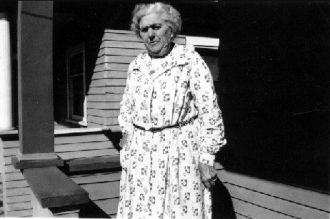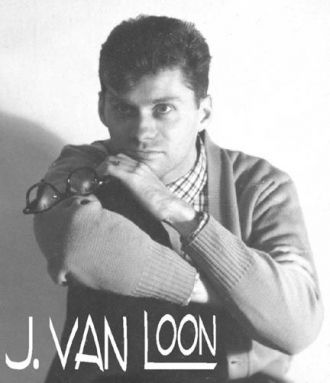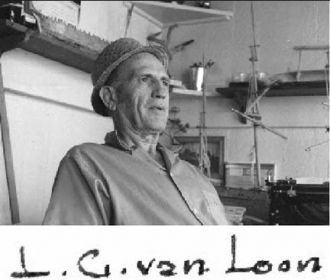Van Loon Family History & Genealogy
Van Loon Last Name History & Origin
AddHistory
We don't have any information on the history of the Van Loon name. Have information to share?
Name Origin
We don't have any information on the origins of the Van Loon name. Have information to share?
Spellings & Pronunciations
We don't have any alternate spellings or pronunciation information on the Van Loon name. Have information to share?
Nationality & Ethnicity
We don't have any information on the nationality / ethnicity of the Van Loon name. Have information to share?
Famous People named Van Loon
Are there famous people from the Van Loon family? Share their story.
Early Van Loons
These are the earliest records we have of the Van Loon family.


Van Loon Family Members
Van Loon Family Photos
Discover Van Loon family photos shared by the community. These photos contain people and places related to the Van Loon last name.

People in photo include: John Van Loon

People in photo include: L.g. Van Loon
Van Loon Family Tree
Discover the most common names, oldest records and life expectancy of people with the last name Van Loon.
Updated Van Loon Biographies


Popular Van Loon Biographies


Van Loon Death Records & Life Expectancy
The average age of a Van Loon family member is 74.0 years old according to our database of 118 people with the last name Van Loon that have a birth and death date listed.
Life Expectancy
Oldest Van Loons
These are the longest-lived members of the Van Loon family on AncientFaces.
Other Van Loon Records
Share memories about your Van Loon family
Leave comments and ask questions related to the Van Loon family.
The name reverts twelve hundred years to the dawn of … HRE, aka the First Reich ('neither Holy, Romic nor empiric'). Back to the establishment of the margraviate and County of LOON, land of 'reward' for generations of supporters of Roman influence.
From the Fifth Century we were all LOOZ 'gangers', subjects of CLOVIS I; cLoVis, possibly spoken to sound like “Lois” or “Lewis”, the wily, cunning and crafty; a wooly & whacky Merovingian with his sainted missus.
Before the 5th Century we would have been denizens of a land between rivers flowing to the North Sea, BETUWE, pronounced, “BAY-2-veh”, Batavorum or Batavii in Latin. There they stood the ground for Rome and sustained themselves on fruit,‘fish and the eggs of sea fowl’.
Before that we'd have sought the provender of salt economies in Paleolithic times. Within those earliest times, those of us who were anteBetuwe, Frankish, PRE-BRITON Saxons traced an ancestry back to NOAH!
"...He made'em all play ball...
Old Man Noah (knew-a-thing-or-two)
HE WAS A GRAND OLD MAN!"
Followers & Sources

Not necessarily the premise of professional historians is a current notion that medieval populations, both identifiable and indigenous, numbered much higher than fixed in established texts. Ancient settlements abutted each other as recorded on published maps of the times. Every other individual in the so-called civilized world seemed to bear titles or acronyms suggesting a broad nobility in place. With such plentitude of established ranking there should've been plenty more folks to oversee. In a Flat-Earth environment people could have been falling off the edges of the world. Periodic unrecorded pestilence and warfare would act to trim the numbers leaving textbook history to pass over seeming unimportant peaks and dips. Lacking some perception, it may be that more historic 'bowls' have been emptied and 'trumpets' blown than we with 'eyes and ears' may have cared to note!
Among the titled folks in Jan vL's ancestral list are two referred as "the Collard" - maybe "Lollard" depending on interpretation of calligraphy or a printer's devil's mistake. Another is named, "Lord of Montgautier and Holh Malox". Attempts to locate places named thusly haven't shown anything specific. Parsing the title by use of the Oxford Dictionary, results in, 'Lordship over Lofty and Lowly Places'. With that thought, the two persons first mentioned may’ve either been believers in a faith that audibly recited prayers and scriptures, or simply a couple of “cabbage heads”. This guesswork suggests that some bestowed titles might reflect a sense of humor of the times. Perhaps many such grants were just medieval 'attaboys' similar to handing out etched and fancy-printed guest plaques and faux certification, for one thing or another, in today's government and business world. A cousin in one of our 20th century related families once received an impressive looking framed document from his peers as members of a so-called “…Amalgamated Brotherhood of Ceiling & Johnnie Painters”, naming him "The High Mighty Potentate of Nonsense". The only apparent genuinely named rank among our vLs of the 14th through the 17th centuries, was that of Jan's father, the one named 'Nicholaes, …Esq., Lt. Col. In Service of the King of Spain in Southern Netherlands'. Then there comes descriptive naming appended to that of Jan vL, Armourer, Trompetter (trumpeter) and Coroner. Certainly a demanding presence could result in bestowal of titular notoriety on this one's person from time-to-time, often more than once, and may've been a family characteristic.
THE ARMOURER
Liége was like a city/state situated along the river Meuse, neither completely German nor French. People had dwelt in the area since Paleolithic times. By the 16th century, the Bishop then in charge; Everhard van der Marck, urged and ensured bankrolling the development of an armament industry. Gunpowder production and state-of-the-art metalworking were advancing. Thus all things related to a burgeoning local economy fell in place. So by the following century, Jan vL as a young man, probably found himself familiar with the art of metalwork and weaponry. Having grown in a family headed by a professional military officer, though not necessarily joining the ranks thereof, living in a arms and metal-working community, it seemed a proper fit to join an enterprise of soldiering for fortune. Thus it would have been appropriate in the 1670s for a young man with the right credentials to want to enlist in a privateering adventure as a shipboard armourer. Such an opportunity rose when, in 1672, two squadrons formed in the Netherlands to stage nuisance raids on English and French enterprises in and across the Atlantic. Possibly Jan v. had technical skill coupled with multi-lingual though heavy on French capability - both based on his hometown background - making him a worthy asset to the venture.
As a non-ranking petty or warrant officer, the Armourer of a ship of war or enterprise was a crewman whose business was to repair guns, cutlasses, handcuffs, locks and such, and to fashion other weaponry as needed. Weapons and department tools, when not in use, were to be received, accounted and cared for by same. As much are the duties of petty officers in charge of what are called 'small arms lockers' on modern naval vessels. In ancient fleets Armourers served as gunsmith, blacksmith, and metal-worker under command of the Gunner or Gunnery Officer. However all were warrant officers and this fellow may've/would've I bet, taken his responsibilities with a great amount of personal pride.
THE TRUMPETER
This role would have taken extraordinary talent. Beyond the time when trumpeters blew out with signals by horn amid armies or at sea, they ultimately became Heralds carrying proclamations and announcements with theatrical aplomb. 'Trompetters' needed at their command wide vocabularies and lexicons. People and especially military brats who lived in places like Liége had to have language skills in many tongues. Likewise trade people such as smiths must've communicated with folks from everywhere, especially if they traveled in and out of a bustling medieval border and river town. It's not surprising then to suppose that Jan was one of those talented gifted individuals as his New World pseudonym De Trompetter declares. He was thus one of a few folks on his cruise used as heraldic envoys to communicate with, and proclaim to commands at various ports of call. In other words, he must've had a 'mouth'!
THE CORONER
The medieval Corner was a keeper of the 'pleas of the crown' in English common law. In court they would probably posture themselves with ostentatious puffery and bombast. By the time our man reached the New World the ancient coroner was becoming an extinct breed. After the last brief Dutch takeover of Niew York, things returned to English rule leaving Jan a subject of the King. Having parted company with his squadron by remaining in the Hudson Valley - his option as a privateer and pragmatic opportunist - he was briefly appointed, possibly the first, Coroner in Albany. This may have been in recognition, by the then new neighbors, of his land acquisitions and having 'a way with words'. Too frequently however those words landed himself in court opposing crown matters so it became expedient by exploiting as excuse to modernize the makeup of the office and appoint a more suitable replacement.
The character attributes thus cited would serve later vLs to pragmatically become voting democrats in their adopted American republic. As 18th 19th & early 20th century democrats such folk would also have been conservative, religious as suiting each individual, and somewhat close minded regarding race and ethnicity
***
LATER THEN…
John a Great-great grandson 1800-1852
An excerpt on the personality of John of the vL Family from a Plymouth, Luzerne Co., Pa. History by Wm.Wright (1873):
"John a…son of Abraham (vL), was a man of keen and sarcastic wit. How many times I have listened with others, to the stories of John van Loon, while the men of the harvest field were lying under the shade of the big cherry tree, on my father's farm on Shawnee Flat, taking the hour's nooning. Like Shakespeare's Yorick, he was a fellow of infinite mirth. He would for a half-hour keep the company in uproarious laughter.
He was a pilot of the Susquehanna and made navigating of arks a part of his employment…"
LATER STILL
Ross van Loon an Itinerant Musician in later days of the Old West
He was a brother of my grandfather, the youngest of eight – 5 brothers & 3 sisters - born in Wapello, Louisa County, Iowa, 1868. Their father was the son of the fore-mentioned John. The mother was remotely related to the Geo. Rodgers/Wm. Clark family. His parents named him “Rossini”. Did they have visions of musical genius lurking in his future, or did he simply howl at birth with operatic gusto?
The father died in Ross's tenth year. So as the siblings matured, they found their fortunes elsewhere, Montana, California, Washington State, Chicago. A note from Wapello in 1961 relates, “Some of the older residents remember that (the mother) lived here until her death and residing with her was…presumably a granddaughter and one (elder) son….Another son Ross lived with them at various times but apparently this was not his permanent home.”
A piano was in the home. A niece relates that an uncle who remained, lived, and died in Wapello was a capable pianist and loved music. Thus under the influence of his big brother, Ross could have acquired his music ability and enough useable talent at home to ply his craft at various entertainment-starved enterprises of the West. Known for sure is that in 1900, Rossini was in Idaho working at two restaurant/bordellos, Headquarters Saloon Nos. 1 & 2 owned and operated by a Geo. E. Bassett. With several others he was resident within at least one, if not both establishments, but he was the sole ‘musician’. Whether being a minstrel, troubadour, jongleur (juggler), or just a piano player is subject to conjecture. However and wherever, he would’ve been a major player coloring little known and various Old West entertainment scenes.
MORE RECENTLY
The referenced niece is Alice "Billie" vL who at a young age sought to perform on the vaudeville stage and did so starting out at least, under the chaperonage of her mother (my grandmother) when 'on the road'. Thus there seems to've been a familial willingness not to shun a limelight. So to sum up in the words of John Kenrick, a vaudeville chronicler, "A pianist also qualified as a musician -- it was the sort of "high-falutin'" terminology that performers used as an antidote to the contempt they received from prudes."…"Chaperones were not common in vaudeville. Any young woman who took up touring was tossing away a major degree of respectability -- it came (should I say went?) with the territory. A young child act would require adult companionship, but from the early teens onwards, performers were on their own. The exception would be a few young adults who traveled with their dedicated stage mothers in tow at all times -- such as Milton Berle or the Marx Brothers."